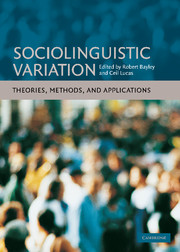Book contents
- Frontmatter
- Contents
- 1 List of figures
- 2 List of tables
- Acknowledgments
- Notes on editors and contributors
- Introduction
- Part 1 THEORIES
- 1 Variation and phonological theory
- 2 Syntactic variation
- 3 The psycholinguistic unity of inherent variability: old Occam whips out his razor
- 4 The study of variation in historical perspective
- 5 Style in dialogue: Bakhtin and sociolinguistic theory
- 6 Variation and historical linguistics
- 7 Second language acquisition: a variationist perspective
- 8 Variation and modality
- Part 2 METHODS
- Part 3 APPLICATIONS
- Afterword: Walt Wolfram and the study of sociolinguistic variation
- References
- Index
2 - Syntactic variation
Published online by Cambridge University Press: 16 February 2010
- Frontmatter
- Contents
- 1 List of figures
- 2 List of tables
- Acknowledgments
- Notes on editors and contributors
- Introduction
- Part 1 THEORIES
- 1 Variation and phonological theory
- 2 Syntactic variation
- 3 The psycholinguistic unity of inherent variability: old Occam whips out his razor
- 4 The study of variation in historical perspective
- 5 Style in dialogue: Bakhtin and sociolinguistic theory
- 6 Variation and historical linguistics
- 7 Second language acquisition: a variationist perspective
- 8 Variation and modality
- Part 2 METHODS
- Part 3 APPLICATIONS
- Afterword: Walt Wolfram and the study of sociolinguistic variation
- References
- Index
Summary
Introduction
This chapter considers the syntax of dialects of English from a view that incorporates issues in dialectal variation and syntactic theory. Variation in dialects of languages such as Italian, German, Dutch, and Flemish has been analyzed in a model of microparametric variation, which takes into consideration the distribution of syntactic variables in geographical areas and formal analyses of syntactic properties (Barbiers, Cornips, and van der Kleij 2002). On the other hand, research on dialects of American English has focused mainly on morphosyntactic, phonological, and, to some extent, syntactic variables in the context of social factors, linguistic constraints, and variation and change. The focus on questions about origins has led to comparative analysis of dialects and English in early periods. By and large, the topic of variation and change in American English dialects has been the domain of sociolinguistics.
Because one of the goals of sociolinguistics is to understand the correlation between social factors and linguistic variation and ordering of linguistic constraints with respect to variability of rules, variation theory is an integral part of the research paradigm. On the other hand, syntactic theory is not always incorporated in variation analyses, although it is clear that sociolinguists are concerned with theoretical notions of the scientific study of language. Along these same lines, there has not been a tradition of incorporating approaches to variation into syntactic theory (Wilson and Henry 1998).
There have been at least three types of approaches to syntactic variation. The variable rule approach accounts for variability by allowing variable rules to apply in different contexts at different probability levels.
- Type
- Chapter
- Information
- Sociolinguistic VariationTheories, Methods, and Applications, pp. 24 - 44Publisher: Cambridge University PressPrint publication year: 2007
- 4
- Cited by



